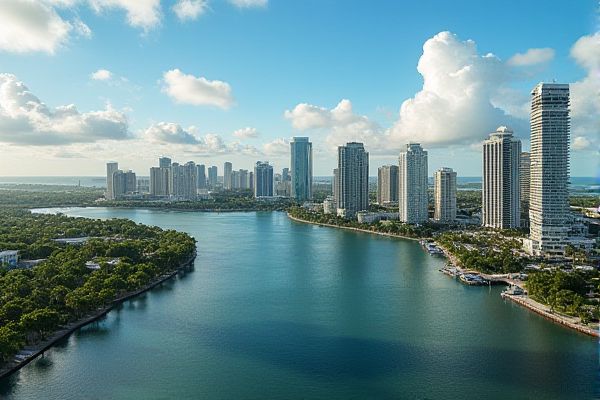
Moving to Florida checklist: Research Florida's climate and weather patterns. Understand property taxes and cost of living. Explore neighborhoods and housing options. Register for Florida driver's license and vehicle. Investigate local healthcare facilities and insurance. Familiarize with Florida's wildlife and ecosystems. Check local schools and educational resources. Update your voter registration information. Learn about hurricane preparations and protocols. Explore recreational activities and social opportunities.
Research Florida's climate and weather patterns.
Florida's climate is primarily humid subtropical in the north and central regions, while the south enjoys a tropical climate. The state experiences a distinct rainy season from May to October, characterized by brief but heavy summer rainfall, followed by a dry season from November to April. Winters are mild, with average lows ranging from 65°F in Key West to 41°F in Tallahassee, though occasional cold fronts can bring freezing temperatures. The climate is also influenced by El Niño and La Niña, which impact rainfall and temperature patterns. For more detailed information, you can explore the Climate of Florida on Wikipedia.
Understand property taxes and cost of living.
In Florida, property taxes are calculated based on the assessed value of your property and the local millage rate, with an average property tax rate of 0.80% and an average annual payment of $2,338. The cost of living in Florida is slightly higher than the national average, with an annual cost per person of around $50,689. This includes expenses such as housing, utilities, groceries, and healthcare. For more detailed information on how property taxes are structured, you can visit the Make Florida Your Home website, which provides insights and resources on navigating financial aspects of living in the Sunshine State.
Explore neighborhoods and housing options.
When exploring neighborhoods and housing options in Florida, it is crucial to research specific areas within your desired cities, considering factors such as schools, commute times, local amenities, safety, and housing costs, including community HOA and CDD fees. For an in-depth guide, you can refer to this Moving to Florida Checklist, which provides essential insights and information to help make your transition smoother and more informed.
Register for Florida driver's license and vehicle.
For new residents eager to register for a Florida driver's license and vehicle, it's essential to gather your vehicle title, proof of Florida auto insurance, and proof of identity. You will then need to visit the DMV to complete the required application and pay the registration fees. Additionally, obtaining a Florida driver's license involves providing two proofs of residency and identity, alongside passing a vision test. For more detailed information, the Florida New Resident Vehicle Guide is an invaluable resource to assist you in navigating these requirements smoothly.
Investigate local healthcare facilities and insurance.
When moving to Florida, it is crucial to investigate local healthcare facilities and insurance options. Florida Health Care Plans (FHCP) offers a variety of high-quality, affordable insurance plans with access to over 9,000 healthcare providers, urgent care centers, and 24/7 telemedicine services, ensuring comprehensive healthcare coverage.
Familiarize with Florida's wildlife and ecosystems.
When moving to Florida, it is crucial to familiarize yourself with the state's diverse ecosystems, including Pine Flatwoods, Sand Pine Scrub, the Everglades, Coastal and Marine Ecosystems, and Freshwater Wetlands. Each of these habitats hosts a unique array of wildlife such as the Red-Cockaded Woodpecker, Florida Panther, and American Crocodile. For more detailed information on these fascinating environments, you can explore Florida's Ecosystems online.
Check local schools and educational resources.
To explore local schools, utilize the Florida Department of Education's website where you can search by county, district, or city. This resource allows you to get in touch with local districts for comprehensive information on magnet programs, extracurricular activities, and assistance for special needs. By navigating this valuable platform, you can make informed decisions regarding your educational opportunities.
Update your voter registration information.
To update your voter registration information after moving to Florida, you can register or update your registration online, by mail, or in person, ensuring you meet the 29-day deadline before an election and providing your legal residential address and necessary identification. For detailed guidance on how to proceed, visit the official Vote.gov website to access all the necessary resources and steps involved in this process.
Learn about hurricane preparations and protocols.
Hurricane preparedness is paramount for ensuring safety during the storm season. It involves meticulous planning, which includes assembling an emergency kit, securing your home, and developing a family emergency plan. One such detailed guide is the 2024 Hurricane Preparedness Guide, which provides comprehensive information on these topics and accessing post-storm recovery resources. Additionally, resources from organizations such as the American Red Cross [outline](https://www.redcross.org/get-help/how-to-prepare-for-emergencies/types-of-emergencies/hurricane.html) steps for evacuating safely, gathering emergency supplies, and protecting your home from wind and flooding. Establishing a well-thought-out hurricane evacuation plan, determining your risk zone, and coordinating with neighbors for mutual support during hurricane season are also essential steps emphasized in many preparedness guides. Staying connected and informed before and during a hurricane can make the difference in your family's safety and well-being.
Explore recreational activities and social opportunities.
Explore recreational activities in Florida by joining resident-led clubs, participating in sports like golf, pickleball, and softball, and engaging in indoor activities such as arts and crafts, music, and theatre. Additionally, get involved in community events, outdoor activities like kayaking and cycling, and socialize through thousands of resident-run clubs and free nightly entertainment. For more details, visit the official Villages Website which offers a comprehensive guide to all the available activities and events.
